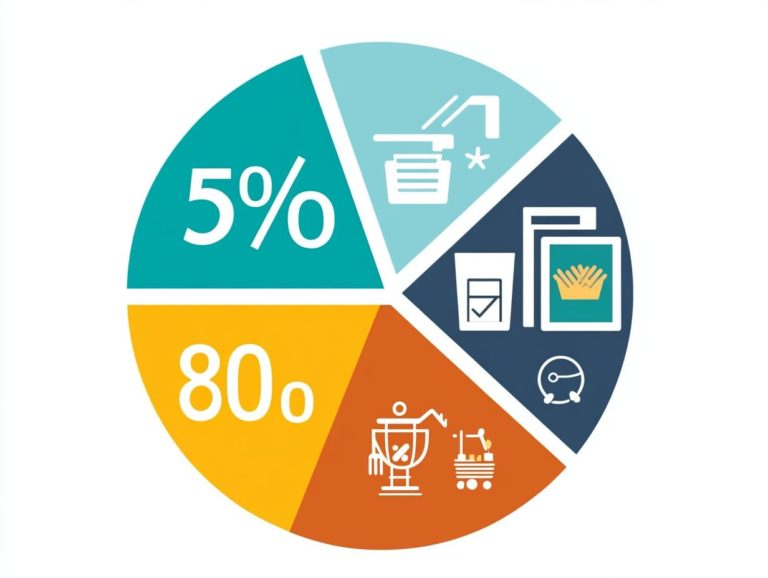Mastering the Art of Expense Tracking
In today s fast-paced world, maintaining a vigilant watch over your finances has become essential. Understanding your spending habits not only illuminates where your money is going but also reveals areas ripe for improvement.
This article delves into effective methods for tracking expenses, whether you prefer the traditional pen-and-paper approach or the latest apps and software. With practical tips and the right tools at your disposal, you can take command of your budget, alleviate financial stress, and truly master the art of financial management.
Dive in to uncover how simple expense tracking can revolutionize your financial life!
Contents
- Key Takeaways:
- The Importance of Expense Tracking
- Methods for Expense Tracking
- Track Expenses Manually
- Using Apps and Software
- Top Tips for Tracking Your Expenses Effectively
- Tools for Expense Tracking
- Benefits of Mastering Expense Tracking
- Frequently Asked Questions
- What is expense tracking and why is it important?
- What are the benefits of mastering the art of expense tracking?
- How can I begin mastering the art of expense tracking?
- What are some tools or methods that can help with expense tracking?
- How often should I review my expense tracking?
- What are some common mistakes to avoid when mastering the art of expense tracking?
Key Takeaways:
- Understand your spending habits to identify areas for improvement and create a budget.
- Utilize manual tracking or apps/software for effective expense tracking and regular reviews.
- Mastering expense tracking improves financial management and reduces stress.
The Importance of Expense Tracking
Expense tracking is essential for businesses aiming to elevate their money management. This practice ensures meticulous management of spending while promoting transparency and compliance within your organizational structure.
Adopt effective tracking systems to uncover hidden costs, optimize cash flow, and make informed decisions about resource allocation and investments.
Integrating automation solutions streamlines the entire process, enhancing vendor selection and boosting employee morale through comprehensive training and strict adherence to spending policies.
Understanding Your Spending Habits
Understanding your spending habits is the essential first step toward mastering effective expense management. It enables you to analyze your financial operations and pinpoint areas ripe for improvement.
Dive into your financial patterns. This helps uncover unnecessary expenditures and redirect funds toward more productive ventures. Learning how to track your expenses using a range of expense tracking tools can significantly enhance this process, streamlining the monitoring of your transactions.
These tools come packed with valuable features, including expense categorization, budget alerts, and visualizations of spending trends. Together, they foster a more disciplined approach to your finances, ensuring financial stability.
Incorporating data-driven insights allows you to gain a deeper understanding of your spending behavior, guiding smarter decision-making and facilitating better budgeting strategies. This holistic approach gives you the power to create tailored financial plans that align seamlessly with your unique objectives.
Identifying Areas for Improvement
Identifying areas for improvement within your expense management framework can greatly enhance your better operations and foster a culture of continuous improvement across your financial operations, ultimately leading to better money management.
Systematically analyze your spending patterns. This helps uncover hidden inefficiencies that can drain resources without significant returns. Employing strategies like regular audits and benchmarking against industry standards empowers you to make informed decisions.
Utilizing advanced reporting tools becomes essential, as they provide valuable insights that facilitate ongoing evaluation and prompt adjustments. These tools enable you to track expense trends in real time, allowing for proactive cost-cutting measures that align with your strategic goals.
This holistic approach ensures that your financial operations remain agile and responsive in today s ever-evolving economic landscape.
Methods for Expense Tracking
You have a range of options at your disposal for expense tracking, from simple manual methods to advanced automation solutions that can significantly elevate your financial operations and procurement strategies.
Track Expenses Manually
Manual tracking is a classic approach that involves documenting your expenses by hand. This method allows you to maintain budgets and adhere to spending policies while ensuring compliance with financial regulations.
Not only does this hands-on method deepen your understanding of financial issues, but it also instills discipline in monitoring your expenditures. Log every transaction carefully. You ll see spending patterns emerge and can make informed decisions that align with your long-term financial strategies.
While manual tracking can enhance your oversight, it is undeniably time-consuming and susceptible to human error. Computer programs that handle tasks without manual input can streamline the process and alleviate administrative burdens. Manual tracking, however, demands your constant attention.
This method is essential for ensuring compliance with regulations and can significantly enhance your financial performance by fostering thorough oversight and accountability.
Using Apps and Software
Utilizing expense management software and apps can significantly streamline your tracking process, offering automation solutions that enhance both efficiency and accuracy think digital receipt tracking that saves you a whole lot of hassle.
These tools empower you to categorize expenses in real-time, generating insightful reports that reveal your spending patterns and uncover potential savings. Integration with banking systems means seamless synchronization of transactions, effectively eliminating those pesky manual entry mistakes.
Popular options like Expensify and Mint truly stand out. They have user-friendly interfaces and robust features that allow you to easily set budgets and analyze your spending.
Don’t wait! These applications are crucial for simplifying your financial operations right now, ultimately fostering better financial health and enhancing strategic partnerships.
Top Tips for Tracking Your Expenses Effectively
Implementing effective strategies for expense tracking can profoundly elevate your financial management. By adhering to disciplined budgeting practices and respecting spending limits, you pave the way for optimal cash flow.
This careful approach can empower you to sharpen your financial oversight and make informed decisions that align with your financial goals, including cost savings.
Creating a Budget
Creating a budget is essential for effective expense tracking. It guides your spending decisions and enhances your financial performance while optimizing cash flow.
This process starts with a thorough assessment of your current income and expenses. This allows you to clearly identify your financial position. Next, by establishing specific financial goals, you align your budget with both short-term needs and long-term aspirations.
With this robust framework in place, ongoing expense tracking becomes much more manageable. It not only helps you stay within budget but also brings to light areas where you might need to cut back on overspending.
Ultimately, a well-crafted budget serves as your roadmap to operational excellence. It cultivates disciplined financial habits and encourages proactive decision-making in your business strategies.
Tracking All Expenses
Tracking all your expenses is essential for gaining a comprehensive view of your financial operations. It helps you uncover hidden costs and fosters transparency within your organization.
By keeping meticulous records of every transaction, you can gain deeper insights into your spending habits and pinpoint areas ripe for cost reduction. This ultimately refines your budgeting strategies.
Leveraging a combination of accounting software and mobile applications allows you to efficiently categorize and monitor expenditures in real time.
Integrating expense-tracking tools enhances accountability among your team. This ensures that everyone is aligned and equipped to make informed financial decisions. To further improve your approach, consider learning how to track your freelance expenses efficiently. This level of financial visibility promotes wise spending and gives you the power to pursue strategic investments, setting the stage for long-term growth and sustainability.
In summary, effective expense tracking is vital for financial health and decision-making. Start implementing these strategies today, and take control of your finances!
Regularly Reviewing and Adjusting
Regularly reviewing and adjusting your expense tracking practices is essential for improving your financial performance. Use reporting tools to gain insights through careful analysis.
Evaluating these practices helps you identify trends and anomalies that might be missed otherwise. This process ensures accuracy and builds accountability within your finances.
Periodic reviews empower you to make informed decisions based on accurate data. This leads to effective resource allocation and strategic planning for future spending.
Aligning your expense tracking with your strategic goals fosters a culture of operational excellence. Ultimately, this enhances your organization s financial health and stakeholder engagement.
Tools for Expense Tracking
You have access to a range of advanced tools for effective expense tracking. These include intuitive budgeting apps and automation solutions that boost both efficiency and accuracy in managing your finances.
Budgeting Apps and Software
Budgeting apps and expense management software streamline financial tracking and improve efficiency. These innovative platforms offer features to simplify personal and business finance management.
Benefit from functionalities like real-time expense tracking, customizable budgeting options, and insightful analytics that reveal your spending patterns. They integrate seamlessly with your bank accounts, providing a comprehensive overview of your financial health.
Many of these tools improve your understanding of financial management with user-friendly interfaces. You can navigate your financial landscape with ease and confidence.
Expense Tracking Templates
Expense tracking templates provide a structured approach to manual tracking, empowering you to maintain budgets effectively. They come in various forms, from spreadsheets to printable forms.
Some templates cater to personal finances, allowing efficient categorization of your expenses. Others focus on small business operations, tracking expenses tied to specific projects.
Using these templates helps you monitor your spending habits and create informed budgets. This organized method of expense tracking leads to better decisions and efficient resource allocation.
Benefits of Mastering Expense Tracking
Mastering expense tracking offers advantages that enhance your financial management. Expect improved transparency, which simplifies decision-making and builds trust among employees and stakeholders.
Effective expense tracking also reduces stress levels, leading to a more organized operation. This diligence drives cost savings and ensures you stay ahead in today s competitive landscape.
Improved Financial Management
Mastering expense tracking can significantly improve how you handle money. This leads to operational excellence and ensures compliance with your spending policies.
By closely monitoring your expenditures, you can uncover patterns and make informed decisions that align with your goals. This practice aids in crafting more accurate budgets and ensures adherence to regulations, minimizing the risks of financial mismanagement.
When expense tracking becomes a habitual part of your organizational culture, it gives the power to your teams to take ownership of their financial responsibilities. Ultimately, this boosts overall efficiency.
By seamlessly integrating expense tracking into your business strategies, you can pave the way for sustainable growth and optimal resource allocation.
Reduced Stress and Anxiety
Reducing stress and anxiety related to financial management is a significant benefit of effective expense tracking. This ultimately contributes to enhanced employee morale and overall financial stability.
Feeling in control of your finances can transform your daily life! It positively influences not just your productivity but also your general well-being.
By maintaining a clear view of your expenditures, you become better equipped to make informed decisions. This fosters a sense of security and confidence.
This transparency alleviates personal stress and enhances trust between you and the organization. Greater financial clarity supports a healthier organizational culture, allowing both you and your leaders to concentrate on strategic goals without the heavy cloud of financial uncertainty hanging overhead.
Frequently Asked Questions
What is expense tracking and why is it important?
Expense tracking is the process of monitoring and recording all of your expenses. It’s important because it allows you to understand where your money is going and helps you make better budgeting decisions.
What are the benefits of mastering the art of expense tracking?
Mastering expense tracking can help you save money and stay on top of your finances. It provides a better understanding of your spending habits.
It can also help you identify areas where you can cut back on expenses and potentially increase your savings.
How can I begin mastering the art of expense tracking?
Start by keeping track of all your expenses, whether through a spreadsheet or a budgeting app. Be diligent in recording every expense, no matter how small.
What are some tools or methods that can help with expense tracking?
Many tools can make expense tracking easier, such as budgeting apps, spreadsheets, or simply keeping receipts and manually recording expenses. Find what works best for you and stick to it.
How often should I review my expense tracking?
It’s wise to review your expense tracking at least once a month to see where your money is going. This allows you to make necessary adjustments to your budget.
However, some people may prefer to review it more frequently, such as weekly or even daily.
What are some common mistakes to avoid when mastering the art of expense tracking?
Common mistakes include not recording all expenses, failing to set a budget, and not reviewing your expense tracking regularly. Don’t get discouraged if you have a bad month; use it as motivation to improve in the future.






